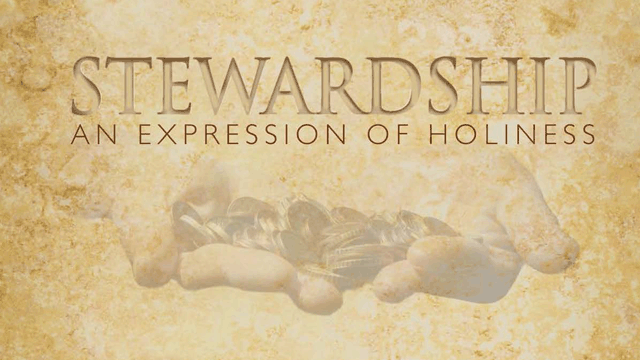
Stewardship, an Expression of Holiness
Giving is the very nature of God. In Christ, God gave mankind the greatest gift of all time. “For God so loved the world that He gave his only begotten son that whoever believes on him will have eternal life.” Every breath we take is a gift from God. Every good and perfect gift comes from God. Our only fitting response to our God whose nature is to give is for us to be like Him and give. That pursuit of giving begins with giving ourselves to Him. We read in Romans 12:1, 2:
I beseech you therefore, brethren, by the mercies of God, that you present your bodies a living sacrifice, holy, acceptable to God, which is your reasonable service. And do not be conformed to this world, but be transformed by the renewing of your mind, that you may prove what is that good and acceptable and perfect will of God.[1]
You cannot pursue holiness without coming face to face with your faithfulness as a steward. Jesus said more about our money and possessions than He said about heaven and hell combined. As a matter of fact, 15 percent of everything Jesus Christ said was on the subject of money and possessions.
Why would Jesus put such emphasis on this subject? Was He desperate for money? Certainly not! He owns everything. Did He want us to worry about money? No way. He taught us to not worry about what we are going to eat or put on. He told us to seek the kingdom of God first. He would take care of the rest. Jesus taught so much on stewardship because stewardship and faith are inseparable. Stewardship is an expression of our faith. It is an expression of holiness.
In John 3, John the Baptist is preaching and three groups ask him what they should do to bear the fruit of repentance. John gave the following answers:
In verse 11 – share clothes and food with the poor
Verse 13 – Tax collectors should not take more than is owed
Verse 14 – Soldiers should be happy with their wages and not extort money
Nobody asked John about money or possessions. It appears that his answers were all about money and possessions, but they were really all about faith. The question: How can we demonstrate spiritual transformation? The answer comes down to this: What we do with our stuff will say much about the extent of transformation in our lives.
Too often, the motivation to receive becomes greater than the motivation to give. Acts 20:35 teaches us that it is more blessed to give than to receive. We think it is a great blessing to receive an offering or gift, but the Bible teaches that the greatest blessing is in giving an offering or gift.
Transformation does not produce selfishness. It does not produce dishonesty. It does not produce greed. The transformed life is generous, accountable, and directed by integrity. We have greater interest in giving than receiving. Transformation produces a desire to please Him with every part of our lives, including money and possessions.
In Luke 19, we see where Zacchaeus had an encounter with Jesus. We know the story where Zacchaeus climbed into the sycamore tree to get a glimpse of Jesus as He walked by. When Jesus came to where Zacchaeus was, He stopped and looked up. He then invited Himself to Zacchaeus’ house. In Luke 19:8, Zacchaeus said to Jesus, “Look, Lord! Here and now I give half my possessions to the poor, and if I have cheated anybody out of anything, I will pay back four times the amount.” Jesus responded in verse 9, “Today salvation has come to this house.”
His change in attitude towards money reflected the transformation that had taken place in his heart. A heart that reflects God is a heart that has surrendered everything to Him. That includes money and possessions.
We are told in Acts 2:45 and Acts 4:32–35 that the Jerusalem converts sold their possessions to give to the needy. Again, this is evidence of transformed hearts.
One of the most powerful illustrations comes from Mark 12:44 where the poor widow puts two small coins in the offering. Jesus said that out of her poverty, she put in everything. It was not about the size of the offering, it was about the condition of her heart. Her act of sacrifice was evidence of a transformed heart.
One of the saddest illustrations is that of the rich young ruler in Matthew 19. This wealthy young man came to Jesus and wanted to know how to gain eternal life. Jesus told him in verse 21 sell your possessions and give to the poor and you will have treasure in heaven. Then come, follow me. He walked away. He was more interested in his wealth than he was in God. You cannot serve God and money. Matthew 6:19–21 says:
Do not store up for yourselves treasures on earth, where moth and rust destroy, and where thieves break in and steal. But store up for yourselves treasures in heaven, where moth and rust do not destroy, and where thieves do not break in and steal. For where your treasure is, there your heart will be also.
It is not bad to have money and possessions. It is bad to value those things more than we value God. The pursuit of stuff provides temporary satisfaction. Pursuit of God provides eternal satisfaction. The money that I do have will either leave me at some point or I will die and I will leave it. My relationship with God covers me now and will cover me for all eternity.
Jesus taught about money and possessions, because He knew we would be tempted to put it before everything else. He knew that we could struggle just as the wealthy young ruler struggled. He knew that stuff would distract us in our pursuit of holiness. It would keep us from fully surrendering to Him.
A life of holiness is a life of surrender. In 1 Kings 17, we find where the Lord told Elijah that he spoke to a widow woman to provide for him. This was a time of severe famine. Elijah gets to town and there is this widow gathering sticks. He told her to bring him a little water. As she was leaving to get the water, he asked her to also bring him a morsel of bread. She then explained her situation. She had no bread. She just had a handful of flour and a little oil in a jar. She was gathering up sticks to cook a last meal for her and her son. Elijah told her not to be afraid. To do as instructed and the flour will not be used up and the jar of oil will not run dry until the Lord sends rain again.
God could have sent Elijah to anyone, but He picked a widow who had nothing and was on the verge of death. You see, God did not choose her based on what she had in the cupboard. God chose her based on what she had in her heart. As a result of her surrender, the flour and the oil did not run out.
We have churches more skilled at fund raising than soul winning. If we are not careful, we will focus on preserving our little bit of flour and oil. We will focus on our abundance of or lack of resources. A true expression of holiness, a real expression of our relationship with Him is to surrender our heart. It is then that our flour and oil will not run out. The bread of life will be abundant in our churches and the oil of the Holy Spirit flowing among us.
Where your heart is, that is where your treasure will be. Where is your heart? Where is the heart of your local church, your nation, this area? Is our stewardship a reflection of our transformed hearts? Oh, God, create in us a clean heart!
[1] The New King James Version. 1982 (Romans 12:1, 2). Nashville: Thomas Nelson.


